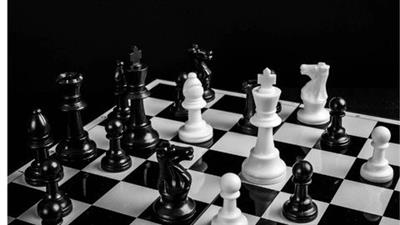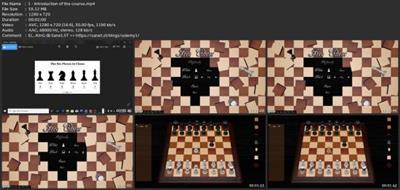Learn How To Play Chess And How To Checkmate Your Opponent
Published 4/2023
MP4 | Video: h264, 1280x720 | Audio: AAC, 44.1 KHz
Language: English | Size: 498.05 MB | Duration: 0h 40m
Master Chess to boos your Intelligent Quota. (I.Q)
What you'll learn
How to become a winner in life, chess is not just a game but a game to improve yourself and i.q
chess make you very intelligent with logical reasoning
you can apply chess to business, politics or psychology
understanding chess will make you become very smart and you will become a problem solver
Requirements
No experience required but you need to take your time for logical thinking
Description
WELCOME TO CHESSIn this course you will be able to understand how to play by the rules of chess also you will learn the name of the chess piece in the chess board.WHAT IS CHESS?A board game of strategic skill for two players, played on a chequered board on which each playing piece is moved according to precise rules. The object is to put the opponent's king under a direct attack from which escape is impossible ( checkmate ).chess is a very ancient game used few years ago, it is also used to play politics, business or mind game, chess is also applicable to psychology, you will be able to test people and predict their move, also chess increase I.Q and make you think smarter, it also help you in fast decision making. Organized chess arose in the 19th century. Chess competition today is governed internationally by FIDE (the International Chess Federation). The first universally recognized World Chess Champion, Wilhelm Steinitz, claimed his title in 1886; Magnus Carlsen is the current World Champion. A huge body of chess theory has developed since the game's inception. Aspects of art are found in chess composition, and chess in its turn influenced Western culture and art, and has connections with other fields such as mathematics, computer science, and psychology.Chess pieces are divided into two different colored sets. While the sets might not be literally white and black (e.g. the light set may be a yellowish or off-white color, the dark set may be brown or red), they are always referred to as "white" and "black". The players of the sets are referred to as White and Black, respectively. Each set consists of sixteen pieces: one king, one queen, two rooks, two bishops, two knights, and eight pawns. Chess sets come in a wide variety of styles; for competition, the Staunton pattern is preferred.The game is played on a square board of eight rows (called ranks) and eight columns (called files). By convention, the 64 squares alternate in color and are referred to as light and dark squares; common colors for chessboards are white and brown, or white and dark green.The pieces are set out as shown in the diagram and photo. Thus, on White's first rank, from left to right, the pieces are placed in the following order: rook, knight, bishop, queen, king, bishop, knight, rook. On the second rank is placed a row of eight pawns. Black's position mirrors White's, with an equivalent piece on the same file. The board is placed with a light square at the right-hand corner nearest to each player. The correct positions of the king and queen may be remembered by the phrase "queen on her own color" - i.e. the white queen begins on a light square, and the black queen on a dark square.In competitive games, the piece colors are allocated to players by the organizers; in informal games, the colors are usually decided randomly, for example by a coin toss, or by one player concealing a white pawn in one hand and a black pawn in the other, and having the opponent choose.White moves first, after which players alternate turns, moving one piece per turn, except for castling, when two pieces are moved. A piece is moved to either an unoccupied square or one occupied by an opponent's piece, which is captured and removed from play. With the sole exception of en passant, all pieces capture by moving to the square that the opponent's piece occupies. Moving is compulsory; a player may not skip a turn, even when having to move is detrimental.Each piece has its own way of moving. In the diagrams, the crosses mark the squares to which the piece can move if there are no intervening piece(s) of either color (except the knight, which leaps over any intervening pieces). All pieces except the pawn can capture an enemy piece if it is on a square to which they would be able to move if the square were unoccupied.with constant practice in chess you will become a pro
Overview
Section 1: Introduction
Lecture 1 Introduction of the course
Lecture 2 Explaining chess piece and the rules
Lecture 3 duel with computer in chess
Lecture 4 the best chekmate move
Lecture 5 Conclusion and a hint guide in winning your opponent
student, workers, politicians as well as businessmen should learn chess it will help you alot
Download link
rapidgator.net:
uploadgig.com:Kod:https://rapidgator.net/file/92b715bd05f818476da9a927d4177bb5/gnxti.Learn.How.To.Play.Chess.And.How.To.Checkmate.Your.Opponent.rar.html
nitroflare.com:Kod:https://uploadgig.com/file/download/43205f9ece812ac4/gnxti.Learn.How.To.Play.Chess.And.How.To.Checkmate.Your.Opponent.rar
1dl.net:Kod:https://nitroflare.com/view/B50D0F40D16797D/gnxti.Learn.How.To.Play.Chess.And.How.To.Checkmate.Your.Opponent.rar
Kod:https://1dl.net/phobxqbh0bmt/gnxti.Learn.How.To.Play.Chess.And.How.To.Checkmate.Your.Opponent.rar
1 sonuçtan 1 ile 1 arası
-
12.04.2023 #1Üye



- Üyelik tarihi
- 20.08.2016
- Mesajlar
- 144.971
- Konular
- 0
- Bölümü
- Bilgisayar
- Cinsiyet
- Kadın
- Tecrübe Puanı
- 153
Learn How To Play Chess And How To Checkmate Your Opponent
Konu Bilgileri
Users Browsing this Thread
Şu an 1 kullanıcı var. (0 üye ve 1 konuk)



 LinkBack URL
LinkBack URL About LinkBacks
About LinkBacks






 Alıntı
Alıntı
Konuyu Favori Sayfanıza Ekleyin